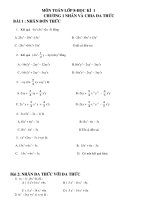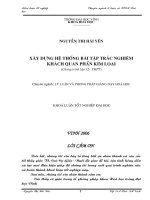Bai tap trac nghiem Anh 8 Phan 1
Bạn đang xem bản rút gọn của tài liệu. Xem và tải ngay bản đầy đủ của tài liệu tại đây (42.21 KB, 1 trang )
<span class='text_page_counter'>(1)</span><div class='page_container' data-page=1>
<b> </b>
Đ
<b>inh Toàn Th</b>
ắ
<b>ng - Tr</b>
ườ
<b>ng THCS Nam L</b>
ợ
<b>i </b>
<b>BÀI T</b>Ậ<b>P TR</b>Ắ<b>C NGHI</b>Ệ<b>M ANH 8 </b>(<b>ph</b>ầ<b>n 1) </b>
<b>Exercise 1 </b>
1. I (sent/ gave/ received/ took) a letter from old friends last week.
2. “Would you (like/ want/ love/ mind) to go to the movies with me? -“ I’d love to”.
3. He is not (enough old to/ enough old for/ old enough for/ old enough to) get married.
4. She is wearing a (red new pretty/ new pretty red / pretty red new / pretty new red) dress.
5. Her mother (left/ leaves/ is leaving/ will leave) this city two years ago.
6. I find Peter is not communicative. He’s rather (kind/ reserved/ sociable/ humorous) in public.
7. They enjoy (to tell/ tell/ telling/ told) jokes.
8. The River Amazon (flow/ flows/ flowed/ is flowing) into the Atlantic Ocean.
9. Deaf-mutes can (both speak and hear/ not only speak but also hear/ neither speak nor hear/ either speak or hear).
10. Alexander Graham Bell was born (in/ on/ at/ during) March 3, 1847.
<b>Exercise 2 </b>
1. They (started/ demonstrated/ delivered/ emigrated) from Canada to America to find work.
2. Would you like (to leave/ leave/ leaving/ left) a message?
3. She came (on/ up/ in/ over) with a new idea for increasing sale.
4. He’ll come (on/ over/ in/ at) to pick you (on/ in/ at/ up).
5. Don’t come in. Pease wait (inside/ downstairs/ outside/ upstairs) for your turn.
6. Our friends (are/ are going to/ go to/ will be to) meet us at the airport tonight.
7. The children are old enough to look after (themselves/ ourselves/ herself/ for themselves).
8. We ought (put/ push/ to put/ to push) the wardrobe in the corner opposite the bed.
9. Take two (teaspoons/ spoonful/ spoonsful/ teaspoon) of this medicine after each meal.
10. You’ll (ought to/ must/ should/ have to) cook dinner yourself.
<b>Exercise 3 </b>
1. The calendar is (on the clock next to/ under the clock between/ behind the clock between/ above the clock on) the pictures and
the lamp.
2. She worked hard (so that/ in order to/ as result/ so as to) she could pass the final exams.
3. Did you succeed (to solve/ on solving/ in solving/ solving) the problem?
4. What was wrong with you? Why (had you to/ did you have to/ must you/ did you must) go to the hospital?
5. (Novel/ Fiction/ Folktale/ Legend) is a story passed on in spoken form from one generation to the next.
6. When I was a child, I (used to/ like/ get used to/ usually) follow my Mom to the market.
7. We must be there (at/ before/ between/ after) 7.30 and 10.30.
8. They’ll arrive (in/ at/ during/ on) Monday, 14 July.
9. I like folktale and (neither/ so/ too/ either) does my sister.
10. They wanted to know (why/ what/ when/ where) she left early.
<b>Exercise 4 </b>
1. My grandfather used (took/ taking/ to take/ take) us to the zoo when she was alive.
2. Oh, that’s nice. Where (do you buy/ are you buy/ did you buy/ you buy) it?
3. Last night I watched the movie Romeo and Juliet. At last they killed (together/ each other/ themselves/ them).
4. (What/ Do/ Would/ Will) you like to come? – I’d love to.
5. Don’t go (outside/ inside/ into/ away). It’s too cold.
6. You must be there (at/ before/ between/ after) 7.30 and 8.15.
7. When my grandmother was young, she used (sing/ to sing/ sang/ singing) very well.
8. Our team played well (too/ that/ so/ enough) to win the gold medal.
9. Don’t let your child (play/ playing/ to play/ plays) with matches.
10. How long will he (must/ should/ have to/ has to) stay there?
<b>Exercise 5 </b>
1. She asked her children (to stop playing/ stop to play/ stop playing/ stopping to play).
2. People (get used to/ didn’t use to/ used to/ are used to) think that the world was flat.
3. His parents are always proud (about/ of/ on/ with) him.
4. I know you worked really (hardly/ good/ bad/ hard) this semester.
5. Mary was born in France. French is her (mother tongue/ first language/foreign language/a and b)
6. John came (with/ along/ across/ off) an old school friend in the street this morning.
7. She advised me (not/ not to be/ not be/ not being) late.
8. He does morning exercises regularly (in order for/ so as to/ so that/ b and c) improve his health.
9. It’s too cold inside. (Do/ Are/ Could/ Why don’t) you close the door, please?
10. She is studying hard (for/ in order to/ so to/ so that) pass the final exams.
</div>
<!--links-->









